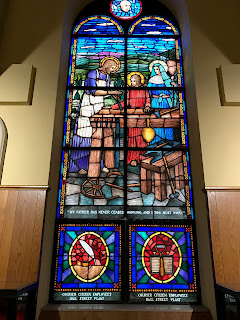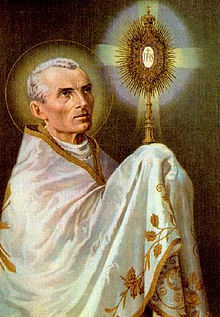Recently, a pro-life measure passed in the state of Ohio
that bans abortions after 20 weeks. This
measure deserves to be commended as a significant step towards giving more
legal protection to those most vulnerable in our society, the unborn. Hopefully, more states will follow suit, and
the days of America allowing abortion for any reason, at any time, will end.
However, there was also a bill proposed that would have
banned abortions upon the hearing of a “heartbeat” in the baby. This generally happens after six weeks. Thus, the passage of this bill could have
spared even more lives than the aforementioned ban after 20 weeks. The organization Right to Life Ohio, as well
as leaders in the Church, however, actively
campaigned against this bill, not because they were opposed to it in principle,
but because they feared it would get struck down in the courts, as apparently
other “heartbeat” legislation has, from other states.
What truly saddens me here is how fearful we have become at
what the “courts” will think. We are
scared of doing the right thing. In this
case, the pro-life leaders of Ohio knew the more just law to pass was the
heartbeat bill. It is a sin to commit an abortion, no matter
if it is after 20 weeks, after 6 days, or 6 hours after conception. Yet, out of fear of what the courts will do,
they opted for the “safer”, less “risky” piece of legislation, which while not
necessarily an evil thing, it was not as good an act as passing the other one
would have been.
This makes me think of other things in the Church we fail to
do out of fear, for example, fear of losing our tax-exempt status. Sometimes, we hesitate to call out evil, out
of fear of being classified as “political”.
Morality, however, does not only exist in the private sector only. Right
and wrong is right and wrong whether it is in the private or public sphere of
society.
But getting back to my point about fearing the courts, I
want to take a moment here to discuss a judge we should truly respect, and yes,
truly fear. We should only fear one
judge, not a judge on a state, federal, or even Supreme Court
in our nation, or in any other nation. There
is ultimately only one person who can and does pass true and just judgment on our lives, and that
is Our Lord Jesus Christ.
We do not speak often of Jesus as judge. Especially in this Advent season when we
think of our particular and our final judgments (which we spoke of in a recent
post), however, we should take some time to think of Our Lord as a judge. There are numerous references to Jesus as Judge
in both the Catechism, and in Scripture.
Let’s start with some references in the Catechism.
#679 Christ is Lord of eternal life. Full right to pass definitive judgment on the
works and hearts of men belongs to him as redeemer of the world. He
"acquired" this right by his cross. The Father has given "all
judgment to the Son". Yet the Son did not come to judge, but to save and
to give the life he has in himself. Yes,
Our Lord did not come down to Earth to
judge (thankfully), but he can and will judge our lives in the end, in glory. He has that right, given to Him by the
Father, out of justice, as we shall see.
#1040 The Last
Judgment will come when Christ returns in glory. Only the Father knows the day
and the hour; only he determines the moment of its coming. Then through his Son
Jesus Christ he will pronounce the final word on all history. We shall know the
ultimate meaning of the whole work of creation and of the entire economy of
salvation and understand the marvelous ways by which his Providence led
everything towards its final end. The Last Judgment will reveal that God's
justice triumphs over all the injustices committed by his creatures and that
God's love is stronger than death. Jesus
Christ is the Logos, the Wisdom of God.
At the Last Judgment, through this Christ, the mysterious ways of God, in
other words, his Wisdom, his Logos, will be revealed. Since the Son of God is the Logos of God, it
is perfectly just and reasonable that he be the judge of our lives.
And now for some Scripture verses:
John 5:22 &
5:27 Nor does the Father judge anyone,
but he has given all judgment to the Son…And he gave him power to exercise
judgment, because he is the Son of Man.
The Catechism quotation above was based on this verse. Jesus is the Logos of God. Everything the Father created was through
Him. That would give him reason enough
to be our judge. However, Our Father, “rich
in mercy” willed that His Son be born, suffer, and die for our salvation. He, the Son, lived among us. That is another
reason was he was 100% qualified to be our judge. He is Our God, and our fellow
man. That is why he has been given the
right to judge.
John
5:30 I cannot
do anything on my own; I judge as I hear, and my judgment is just, because I do
not seek my own will, but the will of the one who sent me. Jesus lived a perfect life. He fulfilled the Father’s will perfectly, and
did so out of love for us. Therefore,
not only does he have a right to judge us, but his judgment will be just. It will be just because a) he knows better
than any of us what a just life is like, and b) he has a heart of mercy, and
has resources available should we fall short of that just standard. He will truly be the just judge.
John 8:15-16
You judge by appearances, but I do not
judge anyone. And even if I should
judge, my judgment is valid, because I am not alone, but it is I, and the
Father who sent me. Our Lord did indeed not judge while he was
among us in the flesh. In this verse, he is speaking in the present
tense. However, he does allude to the fact that he could judge in the
future. The totality of Scripture and
Tradition do teach that he will in fact be our judge.
John 8:26 I have
much to say to you in condemnation. But
the One who sent me is true, and what I heard from him I tell the world. Other versions translate that first part to
say “I have many things to speak and judge
concerning you.” He has the power,
because of the truth in him, to judge.
However, as he says here, at that time, he did not judge. He rather spoke words of truth and mercy,
not judgment. But as is implied, he has
the right and the power to judge.
John 9:39 Then
Jesus said, “I came into this world for judgment, so that those who do not see
might see, and those who do see might become blind.” Our Lord says to the man born blind whom he
healed. Our Lord, in passing judgment,
reveals the truth about ourselves.
Blind people are willing to accept the testimonies of others. Sighted people like to depend on themselves
for final reference. Our Lord exposes
the reality of the matter. Those who see
themselves as the final reference point for all things are not living in truth,
and are judged accordingly. Those humble
people, like the blind man, who know their reliance on God and others, are living in truth, and, too, are judged
accordingly.
John
12:47-48 And if anyone hears my words and does not observe them, I do not
condemn him, for I did not come to condemn the world but to save the world. Whoever rejects me and does not accept my
words has something to judge him; the word that I spoke, it will condemn him on
the last day. Other
translations say “judge” instead of “condemn”. I am sure
you have heard the phrase, “say what you mean and mean what you say”. Our Lord lived that motto perfectly. He speaks only truth. Our lives will be measured against that
truth. However, lest we be fretful because our lives
have not lived up to that truth, let us remember that grace and mercy are a
central component of that truth. We have
to ask the Lord to send us rays of mercy to first expose, and then shatter, the
sin, the falsehoods of our lives.
Our Lord is indeed merciful.
He is just. He is a just
judge. He is the only judge that
matters, the only one who can judge our lives.
No one, not us, not our parents, not our spouses, not our children, not
our friends, not our pastors, not our President, and least of all, not any
human judge, can judge us. Only Our Lord
Jesus Christ can judge us. He will not,
however, until immediately after our last breath, or the end of the world,
whichever comes first. Then, he will judge us. Let us live our lives with that judgment in mind, and no other
judgment. Let us not live in fear of
what others may think of us, be they persons in political, legislative, or
judicial power. Let us be courageous
followers of Christ. Let us live so
that His life, full of truth, mercy, and beauty, lives in us. Let us be bold like him. If we do, then while we will and should always
have a reverent fear of judgment, we
will need not be fearful of it.
Come Lord Jesus, the just Judge!
Joseph most just, pray for us.







